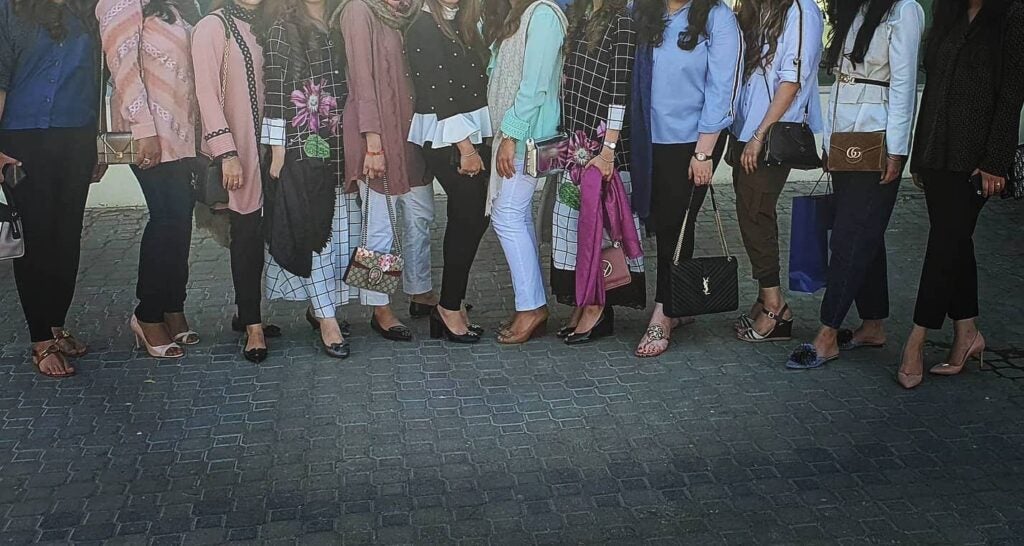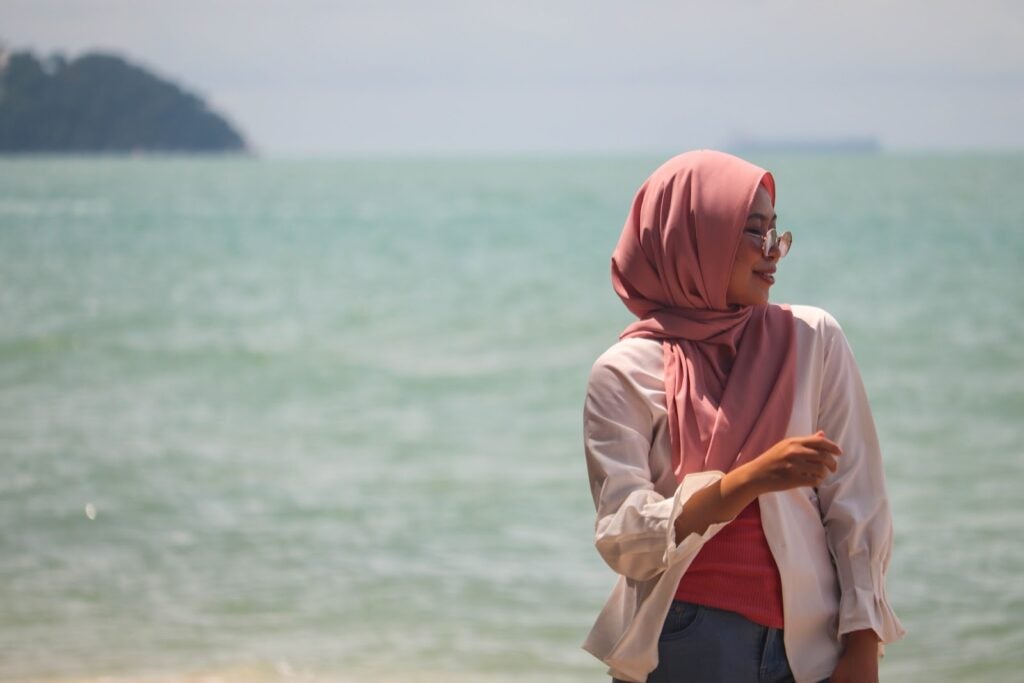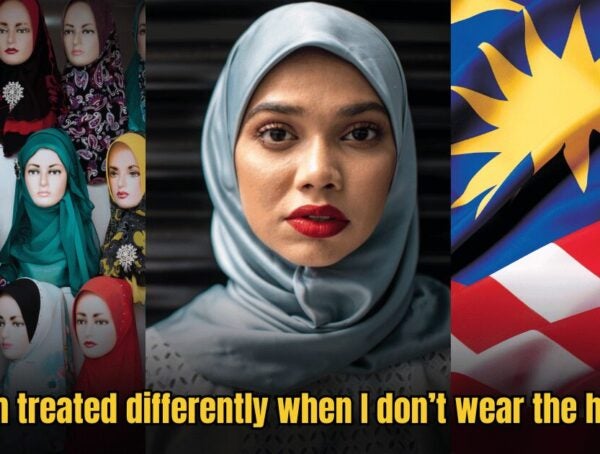Disclaimer: This is a user submission to In Real Life. It is only edited for grammar and formatting. Reader discretion is advised.
Religion – Islam, to be specific – has always been a dominant force in my life, whether out of my own choice or not.
I spent my formative years in Pakistan, practicing Islam in all aspects of my life. I can never recall a time in my life in Pakistan where I wasn’t attending one Islamic class or another.
During weekends in the school year, I was always enrolled in Islamic classes which taught me how to pray, sleep, eat, drink, read the Quran and our last Prophet’s words.

As a pre-teen, this would get monotonous and redundant, and my anxiety would peak during the lonesome snack breaks.
In order to keep me in line with Islam, I was overprotected by my family. While I saw my fellow classmates and friends listening to music, watching TV shows and going out on the town, I stayed home, sheltered in my innocence. I drifted apart from the friends I’d grown up with as well, who told me that we were just too different now.
Growing up in Pakistan pushed me away from Islam
Eventually, I developed a distaste for religion, often blaming it for the majority of my problems as a teenager. I began moving farther away from religion. I found myself lying about having prayed, faking fasts and resenting the fully-covered clothing I was made to wear on a daily basis, all in the name of religion.
However, when my family relocated to Malaysia during my teen years, my perception about Islam began changing completely.
Reflecting back on why exactly I came to dislike the brand of Islam I’d seen in Pakistan, I realised a lot had to do how it was merged with our Pakistani culture. Of course, any culture is beautiful in its own right; however, when it becomes a driving force in society as much as religion, it can cause its own problems.
When someone mentions Islam in Pakistan, a picture of women covered head to toe in black comes up. As I grew up in upper-middle class Pakistani society, this does not hold to be true. In fact, very few women even cover their heads with tudungs.

Instead of dressing and carrying oneself with modesty, pakistani women generally enjoy following fashion trends; hair, clothing, high-end brands found on their person even when picking up their children from school.
Understandably, then, you would expect a more liberal mindset.
Strangely then, they would judge someone for wearing the tudung, rather than not. When I was 13 years old, my mother began donning the tudung for the first time in her life. The number of stares she received, the friends who began criticising her, claiming that Islam was taking her away from them was horrendous to watch.
I wasn’t sure where culture fit in with religion
Gossip, slander, taboos around dating (for example) are rife within the community. You are considered ‘morally loose’ if you mix with the opposite gender before marriage, and somehow that’s because Islam forbids it.
The very word ‘dating’ is a taboo. Instead, the word ‘affair’ is used by the older generation to put down youngsters for attempting to date and find their significant other.
There’s no correlation between wearing a tudung or not and dating. It’s just more important to seem conservative but at the same time have a modern facade to fit into society.
Islam in Pakistan, then, seems to be applied selectively as long as it is in alignment with Pakistan’s original, ancient “honor culture”. Honor culture is derived from the code of conduct where a person feels obliged to protect his or her reputation at all costs.

It’s very black or white – there is no middle ground unlike what I saw in Malaysia. Any deviation from the norm was grounds for bullying: if you don’t wear a tudung, you’re too modern. If you wear a tudung, you’re too conservative.
Applied to modern society, it seemed like it was more about portraying the “ideal woman in the eyes of Pakistani society” rather than actually being holy, inside and out.
The Islam I saw in Malaysia was different
Coming to Malaysia, I was introduced to a different type of Islam – what I now think of as a more genuine one.
During my first year living in Malaysia, two particular aspects about Malaysian Muslims surprised me. The first was their modest clothing.
As a Muslim woman, one of the fundamentals of Islam you’re aware of from a very early stage is the importance of dressing modestly. Full-length clothing with a tudung is compulsory in Islam.
Before I came to Malaysia, I always saw modest clothes as heinously drab and dull – most women in Pakistan, if choosing to be religious, are covered head to toe in black. This is what I knew.

However, in Malaysia, I saw the variety of ways in which modest clothing is implemented: in an endless variety of beautiful baju kurungs, tudungs, and even jeans paired with loose clothing!
Because who says you can’t be modest yet fashionable? Eventually, my relatives in Pakistan would begin asking my mother to bring along Malaysian clothing and tudungs during her visits, because they were just that fascinated.
There was less of a taboo when it comes to dating
The second aspect of Malaysian Muslims which genuinely shocked me was the abundance of people dating without a taboo attached to it.
At the age of 23 I was constantly reminded that I’m getting too old, that I must ‘find a husband’ and settle down soon or no one would want me. Meanwhile, I had Malay friends who were in their 30s, unmarried, and had never faced the pressure of marriage.
This is where I believe culture and religion had merged in Pakistan to create an inherently toxic society for youngsters – something which I didn’t see in Malaysia.
In Malaysia, instead, I saw Islam being practiced for the right reasons. None of my co-workers made fun of those colleagues who religiously went to the surau during work hours, or those Muslim colleagues who didn’t even fast. It was to each their own, and nothing more.
Religion was personal, it wasn’t black and white. No matter how religious or non-religious you were, it didn’t transform your entire personality.
Islam in Malaysia never made me feel bad about myself

On a higher level, it was refreshing to see that, while Malaysia is a Muslim country, non-Muslims are allowed to have the freedom of expression and interest, whether this may be in the form of other religious synagogues, non-halal food or even alcohol.
I always like to joke about how I enjoyed living in Malaysia because it had the perfect halal-to-haram ratio for me.
My parents, who are devout Muslims thoroughly enjoy the accessibility Malaysia allows for Muslims. From promoting the religion to the presence of grand, beautiful mosques and conferences held by international organizations, it’s easy to take part on the beauty of Islam in Malaysia. I’d even attend weekend-long Islamic seminars by the organization Al-Maghrib in Malaysia.
The topics, the method of instruction and their promotion were all targeted towards the youth, and, somehow, it worked on drawing me in – something which had always failed in Pakistan.
At the same time, I do realize that there are a few Malaysian Muslims would disagree with me, who told me they felt Pakistan was the more liberal country. I guess, then, that was just my experience as a foreign Muslim in Malaysia.
At the end of the day, I strongly believe that religion is a personal thing, which each individual should have the levee to decide where they stand with it. However, often enough, it is either influenced on the society or state-level, and not necessarily in a good way.
While I personally could not find my peace with Islam in my home country of Pakistan, I’m glad that I was able to find it in Malaysia.
For more stories like this, read: Brunei’s Sharia Laws: Here’s What Bruneians Think of Them and I Decided To Read The Quran One Day As A Non-Muslim — Here’s How It Changed My Islamophobia

You might also like
More from Real People
‘A RM100 fee cost a company 5 years of revenue’ shares M’sian
This story is about a Malaysian who learned that bureaucracy can be defeated simply by not arguing with it.A billing …
‘I quiet-quit, upskilled, and tripled my salary,’ shares M’sian engineer
This story is about a Malaysian who learned that loyalty without leverage leads nowhere in the corporate world.After years of …
‘I did everything right, and it still wasn’t enough’ shares M’sian graduate
This story is about a Malaysian graduate navigating big dreams in a job market where a degree no longer guarantees …


















